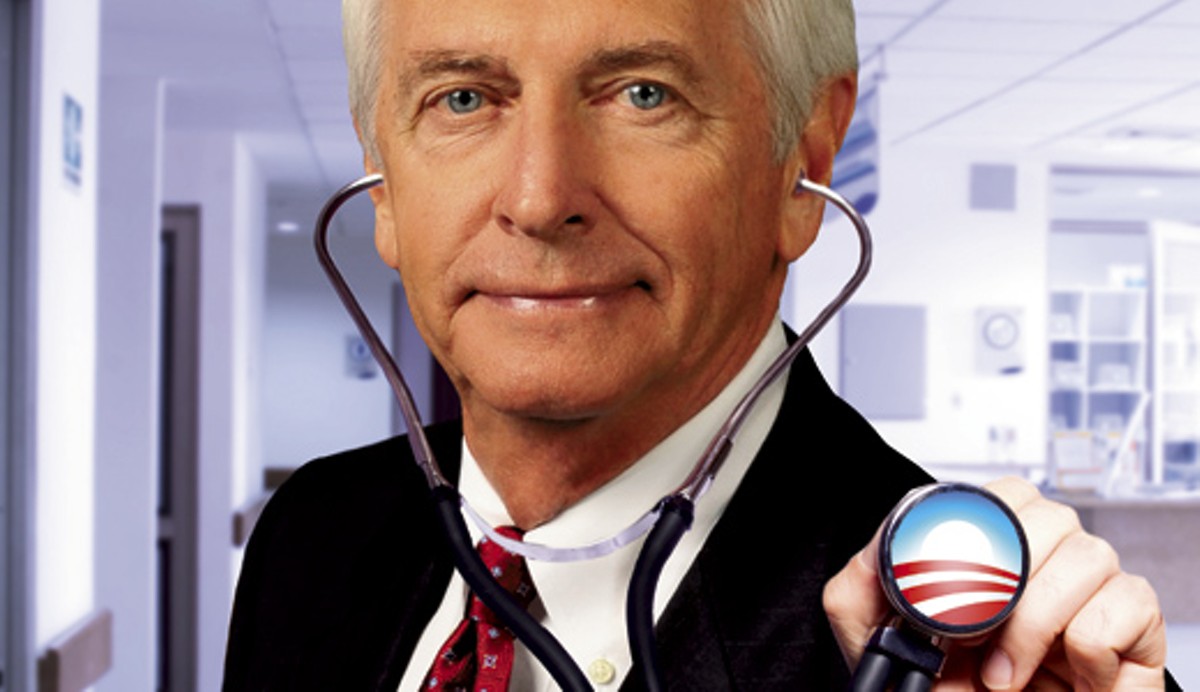Standing before a crowded room full of health care advocates in the state capitol, Gov. Steve Beshear did not underplay the importance of his message, which he said would “change the course of Kentucky’s history.”
In the May 9 press conference, Beshear officially announced he would move to expand Medicaid coverage under the Affordable Care Act starting next year to more than 300,000 previously uninsured Kentuckians making under 138 percent of the federal poverty rate, taking direct aim at the state’s persistently abysmal health rankings.
“This is both the single biggest decision affecting the collective health of Kentuckians in our lifetime, and it was also one of the easiest to make,” Beshear said.
The 2014 Medicaid expansion will coincide with other major reforms going into effect that year, such as the creation of a state health benefit exchange — where an additional 332,000 uninsured Kentuckians can shop for private insurance, with most qualifying for federal subsidies — and additional rights for private insurance holders, such as a ban on denial of coverage for pre-existing conditions, dropping coverage when someone gets sick, and caps on lifetime benefits.
The “no-brainer” moniker Beshear applied to Medicaid expansion was not just due to the opportunity to expand coverage to low-income Kentuckians in need, but the additional economic benefits that Medicaid expansion would bring to the state, detailed by two independent analyses by Price Waterhouse Coopers and the Urban Studies Institute at the University of Louisville.
With the federal government funding 100 percent of the cost of new Medicaid enrollees in the first three years — and slowly decreasing to 90 percent by 2021 — the studies showed a $15.6 billion economic impact over the next eight years that would create 17,000 jobs in the health care industry and expand tax revenue. Expansion would also alleviate costs that previously burdened the state budget while accounting for new cuts — such as federal money for uncompensated care at hospitals — that the state would have had to deal with anyway.
“The question really shouldn’t be, ‘Can we afford to expand Medicaid?’” Beshear said. “The question should be, ‘Can we afford not to?’”
The bottom-line numbers in the studies made the case clear enough that even a staunch conservative critic of the dreaded “Obamacare” had to raise an eyebrow — just as several Republican governors did as they favored expansion in their states. With the expansion of Medicaid, the state budget would actually see a revenue increase of $802 million by 2021, instead of a projected loss if Kentucky chose not to expand.
This fear of all things “Obama” in Kentucky — where the electorate rejected the president by large majorities in the last two elections, and where conservative Democrats, including Beshear, often distance themselves from Obama — was addressed by the governor, who said D.C. gamesmanship should not get in the way of good policy.
“As for the naysayers, they express vague and broad anxiety about costs — fears which the facts refute — and they fall back on partisan politics,” Beshear said. “(They think) if Kentucky expands Medicaid, won’t they be supporting ‘Obamacare?’
“Well, to them, I say, get over it!”
Those Kentucky Republicans whom Beshear told to get over it were not in the room that day, though many would follow up with short statements to the press criticizing the move, expressing fear of increased budget strain in three years or arguing the governor shouldn’t have gone forward without full approval from the General Assembly.
While the likes of U.S. Sen. Mitch McConnell and state Senate President Robert Stivers criticized Beshear’s move with varying degrees of specificity and vigor, the common unmistakable theme among them was that the governor had won the day and there was no turning back.
Unlike other states whose Republican-dominated legislatures have recently blocked Medicaid expansion — the prerogative of each state following the Supreme Court decision on the Affordable Care Act in 2012 — Kentucky’s state House is solidly Democratic and supportive of the measure.
The only critic of Beshear’s move present at the press conference that day — Tea Party activist David Adams — also happens to be the only person lobbing more than just rhetoric at the governor’s implementation of the Affordable Care Act, filing two lawsuits to block Beshear’s unilateral decision to expand Medicaid and set up the health exchange.
While Adams and Tea Partiers are hopeful they’ll accomplish in the courts what conservatives couldn’t in the General Assembly, establishment Republicans — already on icy terms with Adams — have not joined his lawsuits. Assuming the courts rebuff Adams’ underdog lawsuits, the stage will be set next January as Medicaid expansion takes full effect.
Will 2014 and beyond bring about a remarkable improvement in the physical and fiscal health of the commonwealth, or will Republicans get their “told you so” moment?
To Gov. Beshear’s right at the press conference was a poster board detailing Kentucky’s shameful nonpartisan enemy: the “horrendous” health rankings of the state, which is the worst in the country in cancer deaths and preventable hospitalizations, and close to the bottom in cardiac disease, mental health and a host of other indicators.
Beshear noted that scores of research and common sense suggest that once Kentucky’s uninsured working poor have access to affordable health care under Medicaid, they would be less likely to skip or delay doctor visits for basic preventative care due to financial fears of bills they can’t afford, thus improving the long-term health and image of the state.
Advocates ranging from the AARP to Kentucky Youth Advocates argue the same, as nearly 100 health care organizations and advocacy groups voiced support for Beshear’s move.
While most Republicans couch their arguments against Medicaid expansion by saying the state (and federal) government can’t afford it, some conservatives don’t buy the premise that expanded coverage equals improved health.
One such critic is Jim Waters, president of the libertarian think tank Bluegrass Institute, who says Medicaid is such a broken system — with few providers and poor service — that they might as well not have any insurance at all.
“Many people are being told that they will now have great coverage (under Medicaid), great insurance, but they’re not going to have that,” Waters tells LEO. “And they’re going to be enrolled in a program that is not going to serve them.”
Like many critics of Medicaid expansion in recent weeks, Waters points to a study published three weeks ago in the New England Journal of Medicine examining the health outcomes of Medicaid patients in Oregon. The state recently held a lottery that expanded Medicaid coverage to 10,000 previously uninsured people, and researchers found that while these new patients went to a doctor more, they did not show a significant improvement in indicators such as blood pressure and cholesterol levels compared to the uninsured who didn’t win the lottery.
Waters claims the study not only showed no improvement in health among Medicaid patients, but no evidence of reduced financial strain from catastrophic out-of-pocket health care costs, adding, “Even if it did improve their financial health, what’s the difference if it didn’t improve their physical health?”
But as Kentucky Center for Economic Policy director Jason Bailey notes, such an interpretation of the Oregon study grossly misrepresents its findings and Medicaid’s benefits.
“If you actually read the study, it shows a 30 percent reduction in depression associated with having Medicaid,” Bailey says. “You see people who are getting more diagnosis and treatment for diabetes, getting preventative care. And importantly, it virtually eliminated the situation of catastrophic out-of-pocket health care costs for people who get sick, which is one of the main reasons to expand Medicaid, as it keeps people from the risk of losing everything financially.”
Bailey adds that the study only examined health indicators over a period of 17 months, and when it comes to preventative care for chronic conditions, it can take years to achieve noticeable improvements. He also points to a study from the same journal last year showing that the expansion of Medicaid in Arizona, New York and Maine resulted in dramatic improvement in patients’ health and a 6 percent reduction in the mortality rate compared to neighboring states that did not expand Medicaid and saw no similar decrease.
Tony Zipple — the president of Seven County Services, which treats more than 30,000 patients in the Louisville region with mental illness and behavioral disorders — welcomes Medicaid expansion, noting that for the first time, substance abuse treatment will be broadly covered under Medicaid.
“There will be up to 20,000 in our region alone who currently have undiagnosed and untreated mental illness who are now, for the first time in their life, going to have the means to actually get that illness treated,” Zipple says. “As folks who treat people with these illnesses and see what great promise recovery holds for them, that’s just an incredibly exciting prospect.”
However, even Zipple and Medicaid expansion’s fiercest advocates concede that a major challenge to its implementation will be improving the glaring disorganization over the last two years by the state’s Medicaid managed care system.
In a late 2011 move to save $1.3 billion in the state budget over three years, Gov. Beshear decided to contract out Medicaid services to private managed care organizations (MCOs). What followed was at best a mess, and at worst a disaster, as the MCOs were drastically late on payments to Medicaid providers, leaving hospitals alone on the hook for up to $85 million.
Waters of the Bluegrass Institute says Medicaid expansion will only throw more people into a managed care system that is already failing.
“Why should we have any confidence that this state government can implement a major program like Obamacare in Kentucky and do it in a way that benefits taxpayers?” asks Waters.
Tea Party activist David Adams ratcheted up the rhetoric even further, describing Medicaid itself as a “death panel.”
“We have had people waiting to get into a provider (for) medical care die for lack of care, with their Medicaid card in hand,” Adams says. “It doesn’t make sense. It is absolutely death panel-like in its effect on Kentucky’s citizens.”
At his press conference, Beshear assured that progress was being made to “iron out the bumps in the road” with managed care — which he generously described as “working pretty well” — and said the MCO contracts would be amended to account for the expanded population.
Regan Hunt — executive director of Kentucky Voices for Health, a large coalition of groups supporting expansion — agrees that progress is being made toward fixing managed care’s growing pains, but it is “by no means fixed.”
“I think that’s going to be an ongoing issue that we’ll have to monitor and pay close attention to from here on out,” Hunt says. “The managed care situation has to be remedied even if we didn’t expand Medicaid.”
On the pure issue of the financial cost of Medicaid expansion for Kentucky, Beshear came armed with a plethora of numbers and facts from the independent studies, mocking the fiscal doubters as being “without any real evidence” for their claims.
Still, those numbers are just projections, and while most Republicans can’t definitively refute them, they are skeptical everything will go as planned.
“At this point, there’s no way of really knowing what the cost is going to be,” Waters says. “That’s why so many states are saying no to the federal government even though they’re waving millions of dollars in front of them.”
Bailey of the Kentucky Center for Economic Policy argues that even if all of the fiscal projections turn out to be overly optimistic and the budget winds up slightly in the red, “It’s still a great deal for Kentucky’s future, given how poor our health is.”
When asked for comment on the accuracy of Beshear’s numbers, Senate Majority Leader Damon Thayer, R-17, declined to speak to LEO, and Senate President Robert Stivers, R-25, sent a statement merely criticizing the governor for making the move unilaterally.
Though Republicans argue Kentucky voters will reject Obamacare and tie state Democrats to the unpopular president — a talking point Sen. McConnell has already previewed for his re-election campaign next year, along with those wishing to take the state House majority away from Democrats — a recent bipartisan poll conducted by Lake Research Associates found a large majority supports Medicaid expansion.
The governor didn’t back down from that fight at his press conference, saying, “If you want to embrace Washington-style politics and invoke Washington-style arguments and embroil Kentucky in a Washington-based debate, then go to Washington, because we don’t need you here.”
The ultimate verdict will likely come next year — and the years after — when Kentuckians can finally take a fully implemented “Obamacare” out for a test drive.






